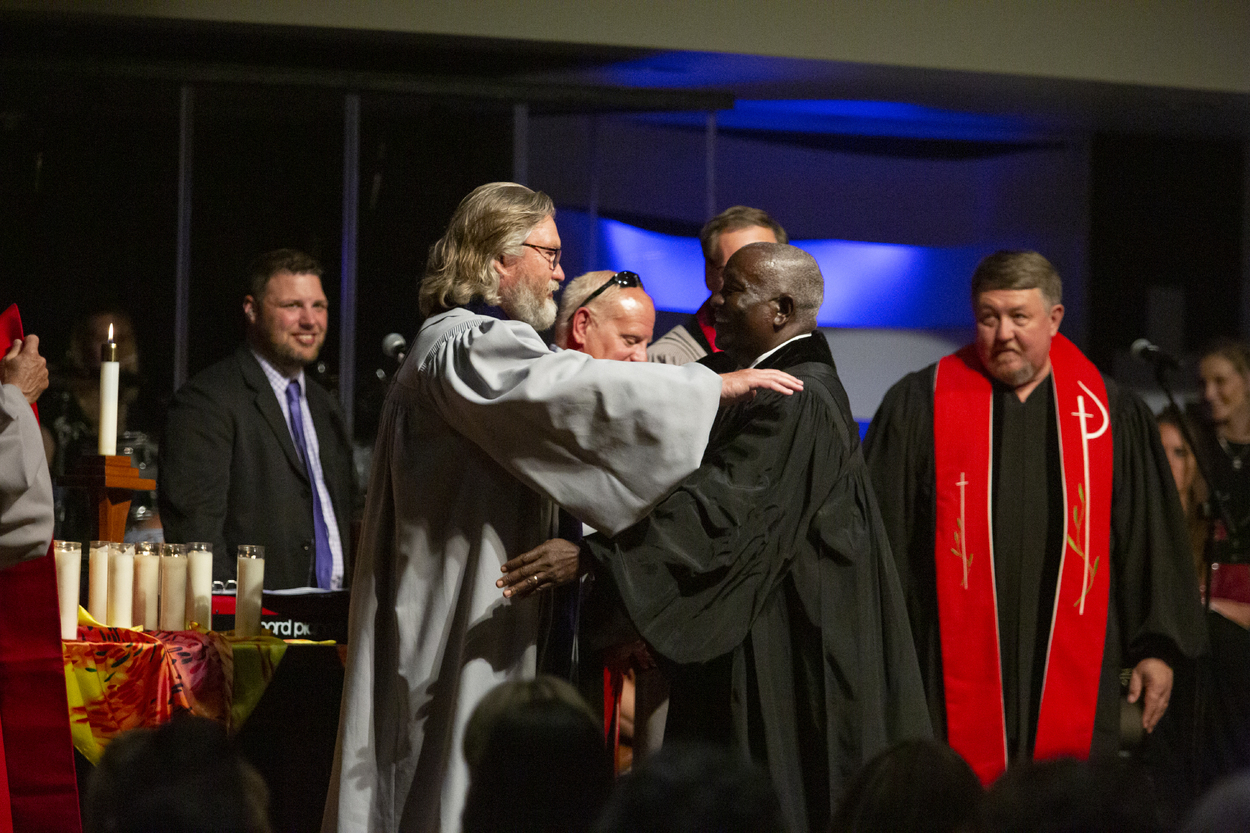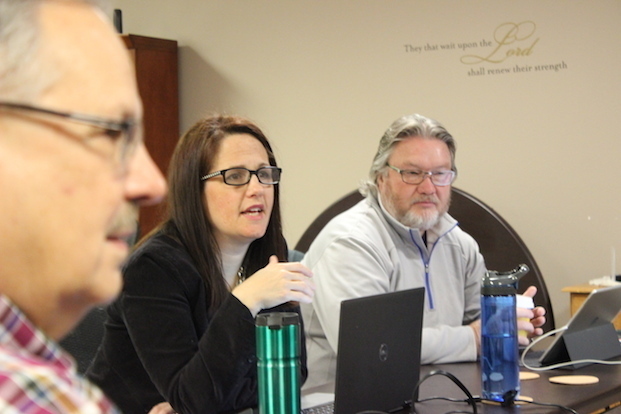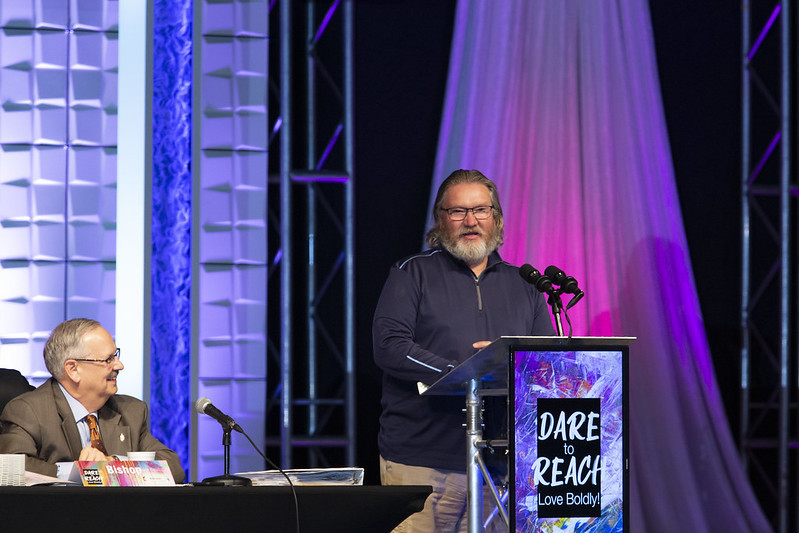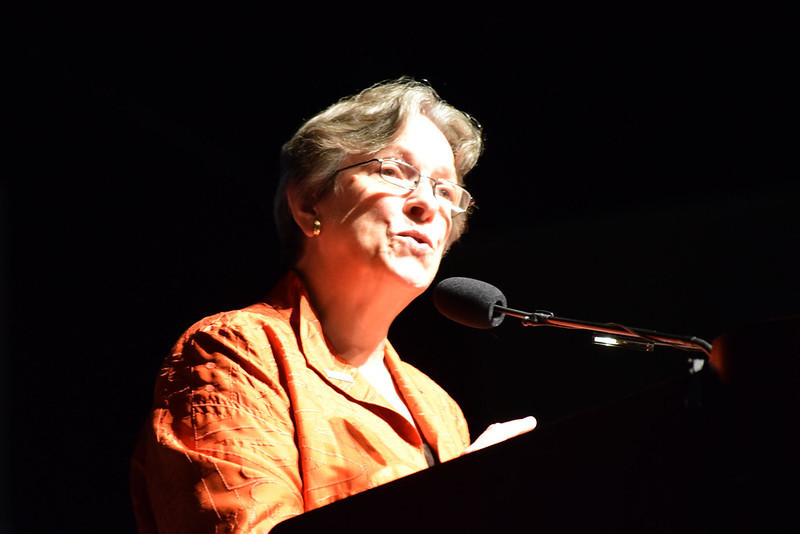
Empower, evangelize, compassion: Rev. Kermit Culver’s ministry journey

Kermit Culver, left congratulates, newly ordained Rev. Juwle Nagbe, during the Celebration of Life in Ministry Service. Photo by Joni Rasmussen, jlynnstudios.
As a 16-year-old, in Iroquois, South Dakota, Kermit Culver remembers hearing that he should have a personal relationship with Jesus. Culver was always involved in Methodist Church growing up. Shortly after turning 16, Culver started entertaining the idea that he was being called to ordained ministry.
A group from the Christian Mission Alliance Church, from Huron, South Dakota, came to Iroquois and was singing in the Legion Hall. During intermission, one of the members of the church group approached Culver and his brother and asked them if they wanted to be saved.
It made an impression on Kermit. He thought, "if this kid can invite me to give my life to Jesus, I could do that and should do that." It was a formative time for Culver's spiritually. He kept connected with the Mission Church. Pastor Dick Duggan led the congregation in Huron, South Dakota, and invited 30 young people in ministry, including Kermit.
"I wasn't a bad kid. I just knew something was missing in my life. I wanted everything. And I thought why wouldn't I want to do this," Culver says. "I was probably not paying attention, but I don't remember hearing anything like that. It was shortly after; still 16, I started entertaining the idea that I was being called."
Susan, Kermit's wife, was a member of the music group that was performing that night. That was their first encounter, they dated throughout high school, stay connected throughout their years in higher education, and married.
"I was probably not smart enough to understand that you could be a Christian and not be a minister," says Culver. "What I understood was you either had to be a missionary or a pastor. I knew I didn't want to go to Africa. So I thought well I could be a pastor."
He was invited to preach his first sermon in the fall of 1972. Culver illustrated, with yarn, how we are connected to God. "I was 16, in Esmond, South Dakota," he says. "Before that, my greatest ambition was to be a taxidermist. I might do that and be a farmer. That changed when I explored my call through that first sermon."
His parents rewarded the effort, with the money from the Esmond congregation, they gave him a gift of a leather Bible and a pocket watch with the date of the first sermon engraved it.
After high school, Culver attended Dakota Wesleyan University (DWU). He was involved in football, Fellowship of Christian Athletes (FCA), and religious life on campus.
His junior year, the campus pastor left. "He didn't show up work one Monday. He left his job and family behind," says Culver.
The president at the time, Don Messer, approached Culver and two of his buddies involved in FCA. Messer told the three, "You guys have to do campus ministry for the rest of the semester. We are not going to be able to hire someone right now."
That was the beginning of his ministry. He helped to lead chapel and Bible studies. He also headed out to the Crow Creek reservation during the summer and led ministry.
Culver's family was supportive. "My dad did not want us to stay on the farm. He wanted each of us to figure out what we wanted to do. They knew ministry was right for me," says Culver. "My dad wrote me a letter, after the death of a close friend, and said that I was on the right path."
After graduating from DWU, he was hired by Rev. Duane Voas, the older brother to Rev. Ken Voas, to lead youth ministry in Iowa. Culver spent a year at Iowa Falls, seeing young people give their lives to Christ.
"It was a great year. Some of the people that were engaged in the youth ministry are still in ministry today," says Culver.

Rev. Kermit Culver, far right, listens during a Dakotas Conference Cabinet. Photo by Dave Stucke, Dakotas Conference.
He headed to Asbury Seminary in Kentucky, where he focused on studying and completing his degree. Culver's first appointment was in Stickney, South Dakota. Rev. Ken Voas was the district superintendent.
"I thought we would stay there for my career. I loved it. A small town and farming community was right up my alley. Susan kind of wanted to have a grocery store that had green peppers availble. So, we decided that maybe we should move," says Kermit.
They moved to Rapid City, South Dakota to First United Methodist Church. There Culver focused on youth ministry and evangelism. Dick Ward was the lead pastor.
"I spent four years at First Church," says Culver. "When it was ending, there were four suicides, and one was the son of a pastor. It became a time of dysfunction and burn out for me."
Culver was called by Dr. Jim Beddow, who was the president of Dakota Wesleyan University at the time. Beddow invited Culver to return to DWU and lead the campus ministry. It was a half-time position.
"I had two children and needed a full-time job," he says. "So, I was given the opportunity to coach and teach. I had been a football player at DWU and always wanted to coach. I also wanted to give teaching a try."
He spent eight years of coaching, teaching, and leading campus ministry. The ministry grew into a full-time role, so Culver stayed connected but focused on teaching and coaching and let someone else lead campus ministry.
In 1996, Culver got a call while on vacation in Florida, from Rev. Art Scanson. Scanson was a district superintendent in North Dakota and invited Culver to be the pastor at First United Methodist Church in Bismarck, North Dakota.
"I told Art that I have a job I love. I don't want to leave," says Culver. "I went to Bismarck to meet with folks and asked them what they wanted me to do. They said they wanted help growing spiritually. I thought well that is good, but not measurable. Then a young woman said that the church had lost about 20 families in the last two years, and they needed help growing younger. That became my calling card for the next 20 years of ministry, helping the church grow younger."

Rev. Kermit Culver, right, addresses the 2019 Dakotas Annual Conference in Bismarck, North Dakota.
It was a ministry of transition and discovery. There were some struggles to try to live into a new expression of faith that is inviting to young families. In 2008, a capital campaign was launched to build a new building.
"We started this capital campaign in 2008, and the market crashed. We kept going," says Culver.
A new identity was established in 2010, Legacy United Methodist Church. The construction of the new building began in 2012, with the opening in the fall of 2013. When Culver arrived in 1996, the average weekly attendance was less than 250. Today more than 500 people are attending each week at Legacy.
In 2012, while on a sabbatical, Culver took the time to write and refine his mission statement, empowering others to love God authentically.
In 2016, Bishop Bruce R. Ough asked Culver to serve as the Northwest District Superintendent. A position that has allowed him to live out his mission—empowering to love God authentically.
"Bishop Ough asked me to be the district superintendent, and it interrupted my grand plan to move out of ministry at Legacy gradually. The move has been great for Legacy and me."
After 43 years in ministry, Pastor Kermit lives with a passion and spirit of evangelism. "I love what Jesus has done for me. I don't want to keep that to myself. I want other people to have and experience what I have."
He says there have been many mentors and great friends along the way, including Rev. Duane Voas, Pastor Dick Duggan, Dick Ward, and many others. DWU Ron Parks and Gordy Fossness were influential in Culver's life.
"My dad died my senior year in college. Gordy became my father figure," says Culver. "One thing I will always remember that Duane Voas told me was this, 'Kermit you have the skills, compassion, and commitment.' He gave me great practical advice. "
Several bishops have guided his ministry. Bishop Armstrong ordained Culver as a deacon. Bishop Bolten left an impression with this statement, "One can neither orchestrate or prevent the work of the Holy Spirit."
Culver says Bishop Michael Coyner changed the culture in the Dakotas Conference. "Coyner told clergy, who lived with a sense of doubt and scarcity, 'There are sinners in every town. Therefore, you are not out of business.' It encouraged me and gave me a sense that my work was important," he says.

Bishop Deborah Lieder Kiesey addresses the North Central Jurisdiction in 2016. Photo by NCJ communicators.
Bishop Deborah Lieder Kiesey was graceful and kind recalls Culver. "I will always remember her sermon at North Central Jurisdiction. It was brilliant and left a lasting impression."
"I have been especially grateful and enjoyed working with Bruce (Bishop Bruce R. Ough), says Culver. "Even though he pushes me. It's has beem a great appointment and experience."
Spiritual practices that keep Culver's faith burning include self-examination and self-discipline. He is not sure where God is leading him but will begin by nourishing his soul. "You can ignore your own need to fuel spirituality. I am looking forward to retirement getting into a rhythm with spirit practices. I have not always been good about sabbath," he says. "You can retire from your work, but you cannot retire from your calling and God."
The pending split of the denomination Culver sees as a chance to be better, not just different. "Let's not waste a good reformation. Let's come out of this better. Let's be truer to the Gospel and Jesus."
COVID-19 allows us to reset. Culver suggests that there are times when we push the reset button and times when someone or something else pushes the button.
A friend, of similar age, recently told Culver that, "The 60 years of our lives have been the best of times." Culver reflects that his parents survived the Great Depression. He has not had to live through such a time, only turbulence like Vietnam, and conflict in the Middle East. There has not been worldwide conflict. His life trajectory has been upward, of time perior where things always seem to be getting better.
"COVID changes that. It is a reset. I hope we reset our lives, faith, and our world," says Kermit. "None of us would have chosen this. I hope we don't waste this reset opportunity. It is time to look at what it is and isn't significant, that we are willing to give up."
As he moves into retirement status, Culver says, "My greatest joy is helping people figure out what God wants to do with their life. I think about the number of people I have encountered and where there are today. I hope I have been true to my mission."
Kermit will move with his wife Susan to Nashville, to live near their two sons. They have purchased a house along the Cumberland River. "I am going to mow in the morning and putt in the afternoon. God will help me to figure out what is next. Perhaps teaching, there are no borders or boundaries with God's call," he says.